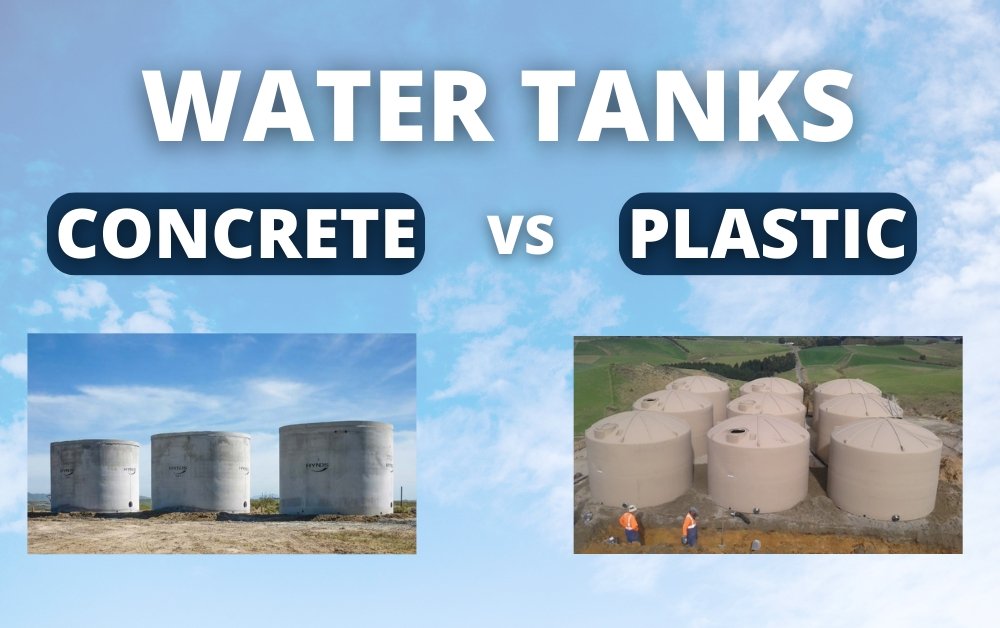Concrete vs Plastic Water Tanks: We Compare

A water tank is almost a must-have in rural New Zealand for both saving water and money. So then, what type of water tank is right for you? When comparing concrete vs plastic water tanks, factors like durability, cost, and material should all be considered; however, researching which of the two options is the right choice can be a lengthy task. With that in mind, we thought we’d do the hard work for you and compare them below to help you make a more informed choice.
Plastic Water Tanks
Recently plastic water tanks have been the industry's preferred option over concrete. This is because of their leak-proof, lightweight, economical, rust-proof, durable, easy to transport, and very low maintenance design. Not only that, but you can get plastic tanks in various shapes and sizes, including slimline versions, making them a versatile choice.
Advantages
- Leak-proof — Robust and durable construction means you won't have to worry about costly leaks.
- Lightweight — compared to a concrete tank, plastic tanks are far lighter, making them more portable and more versatile with the ability to switch locations if needed.
- Corrosion and rust-proof,
- More budget-friendly
Advantages
- If for some reason, the plastic coating on the tank is damaged, the water tank can become brittle from UV exposure.
- Water in plastic water tanks will be warmer during the summer months than water held in a concrete tank.
Concrete Water Tanks
So, how do concrete water tanks hold up when comparing concrete vs plastic Water Tanks? Concrete water tanks are the older option on the market. You can get them in a range of shapes, from round to rectangular, and they're very durable and sturdy. However, there are benefits and drawbacks to consider with concrete, just as there is with plastic.
Advantages
- Relatively easy to clean
- Longer life compared to plastic water tanks (up to 50 years)
- Keeps water much cooler during the hot summer months
Disadvantages
- Being the heavy material that concrete is, it is very difficult, if not impossible, to move once you get it in place. This is even before you add water to it.
- Concrete tanks are costly. Putting aside the tank's initial cost, transport and excavation are also, on average, more expensive than plastic, meaning overall project costs add up very quickly.
- With multiple joins in each structure, cracking in a concrete water tank is more likely. Without regular maintenance, you increase the chances of cracks forming even further.
Also, even though concrete won't rust, it is prone to corrosion, which can also cause eventual leaks if you don't catch it right away.
Concrete vs Plastic Water Tanks — Comparison Table
Plastic Water Tanks |
Concrete Water Tanks |
|
|
Colour Resistance (UV Rays) |
Low resistance to UV light |
High resistance to UV light |
|
Construction |
Easy installation process |
Requires skilled contractors to make it waterproof |
|
Cost |
More budget-friendly |
Expensive, especially installation |
|
Flexibility |
Connection point is flexible |
Connection point is rigid |
|
Leakage |
Not prone to leaking |
Prone to leaking without routine maintenance |
|
Maintenance |
Lower cost — virtually maintenance-free |
Higher maintenance costs and needs |
|
Material |
Lightweight but durable polyethylene |
Heavily reinforced concrete |
|
Shape |
Cubical or cylindrical |
Virtually any shape or size, depending on your needs |
|
Size |
1,000L to over 30,000L |
Built to any size capacity |
|
Strength |
Lower breaking point |
Very high breaking point |
|
Temperature |
Water may be warmer during summer |
Water stays cool all year round |
|
Transportation |
Very portable and easy to move |
Very difficult or immovable |
|
Warranty |
Usually comes with a pro-rata warranty |
Typically not covered by a pro-rata warranty |
Contact Rural Water NZ for High-Quality Plastic Water Tanks
When it comes to Concrete vs Plastic Water Tanks it’s important to weigh up the pro’s and cons for your particular situation. At a glance, plastic tanks offer far more benefits than concrete ones, especially if you want something durable that won't break your budget, At Rural Water NZ, we have a host of quality plastic water tanks to suit your needs. We invite you to browse our stock and make your selection. If you're unsure, reach out to our professional and friendly staff for a free water tank quote today.

